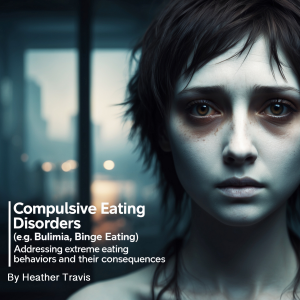

Compulsive Eating Disorders (e.g. Bulimia, Binge Eating):
Heather Travis
This audiobook is narrated by a digital voice.
In the quiet privacy of kitchens after midnight, in the secretive moments between meals, and in the complex emotional landscape of daily life, millions of people engage in a battle that remains largely invisible to the outside world. Compulsive eating disorders represent one of the most misunderstood and stigmatized forms of mental illness, where the very substance essential for survival becomes a source of shame, obsession, and psychological torment that can consume every aspect of a person's existence. Unlike addictions to substances like alcohol or drugs that can be eliminated from one's life, those struggling with compulsive eating must navigate recovery while maintaining a relationship with food three times daily, making these disorders uniquely challenging and complex.
The relationship between humans and food extends far beyond simple nutrition to encompass culture, emotion, social connection, comfort, celebration, and identity in ways that make eating disorders particularly insidious and difficult to understand. Food serves as more than fuel for the body; it carries memories, emotions, and meanings that become deeply intertwined with psychological well-being and social functioning. When this fundamental relationship becomes disordered, it affects not just physical health but emotional stability, social relationships, and basic quality of life in profound ways.
Compulsive eating disorders encompass a range of conditions including binge eating disorder, bulimia nervosa, anorexia nervosa, and other specified feeding or eating disorders that share common features of obsessive thoughts about food, weight, and body image combined with compulsive behaviors around eating that feel beyond conscious control. These disorders affect individuals across all demographics, though they disproportionately impact women and often begin during adolescence when identity formation and body image concerns are particularly intense.
Duration - 51m.
Author - Heather Travis.
Narrator - Digital Voice Matt G.
Published Date - Thursday, 23 January 2025.
Copyright - © 2025 Heather Travis ©.
Location:
United States
Description:
This audiobook is narrated by a digital voice. In the quiet privacy of kitchens after midnight, in the secretive moments between meals, and in the complex emotional landscape of daily life, millions of people engage in a battle that remains largely invisible to the outside world. Compulsive eating disorders represent one of the most misunderstood and stigmatized forms of mental illness, where the very substance essential for survival becomes a source of shame, obsession, and psychological torment that can consume every aspect of a person's existence. Unlike addictions to substances like alcohol or drugs that can be eliminated from one's life, those struggling with compulsive eating must navigate recovery while maintaining a relationship with food three times daily, making these disorders uniquely challenging and complex. The relationship between humans and food extends far beyond simple nutrition to encompass culture, emotion, social connection, comfort, celebration, and identity in ways that make eating disorders particularly insidious and difficult to understand. Food serves as more than fuel for the body; it carries memories, emotions, and meanings that become deeply intertwined with psychological well-being and social functioning. When this fundamental relationship becomes disordered, it affects not just physical health but emotional stability, social relationships, and basic quality of life in profound ways. Compulsive eating disorders encompass a range of conditions including binge eating disorder, bulimia nervosa, anorexia nervosa, and other specified feeding or eating disorders that share common features of obsessive thoughts about food, weight, and body image combined with compulsive behaviors around eating that feel beyond conscious control. These disorders affect individuals across all demographics, though they disproportionately impact women and often begin during adolescence when identity formation and body image concerns are particularly intense. Duration - 51m. Author - Heather Travis. Narrator - Digital Voice Matt G. Published Date - Thursday, 23 January 2025. Copyright - © 2025 Heather Travis ©.
Language:
English
Chapter 1: The Hidden Epidemic
Duration:00:10:24
Chapter 2: The Complex Psychology of Food and Control
Duration:00:09:54
Chapter 3: Recognizing the Signs Behind the Mask
Duration:00:10:01
Chapter 4: The Path to Healing and Recovery
Duration:00:10:34
Chapter 5: Creating a Culture of Body Acceptance and Food Peace
Duration:00:10:51